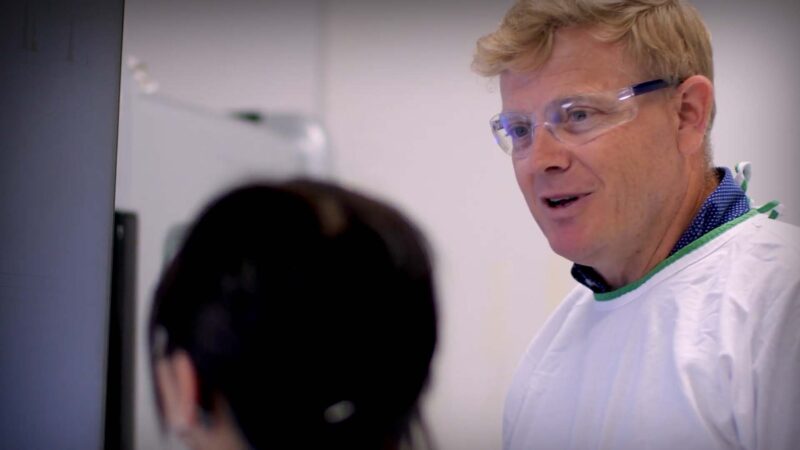RESEARCHER PROFILE
Professor Stuart Brierley (Filmed February 2024)
Director of the Visceral Pain Research Group,
Director of the Hopwood Centre for Neurobiology &
Theme co-Leader of Lifelong Health
South Australian Health and Medical Research Institute (SAHMRI)
Professor Stuart Brierley is Director of the Visceral Pain Research Group, Director of the Hopwood Centre for Neurobiology, and Theme co-Leader of Lifelong Health at the South Australian Health and Medical Research Institute (SAHMRI).
He has developed a strong track record in coordinating and working in multi-faceted research programs for high impact publications in journals. His work has attracted four NHMRC Fellowships including other NHMRC and NIH grants.
The global pandemic has shed light on the severity of the Opioid Crisis, highlighting the urgent need for effective pain treatments. During his 24 years as a researcher, Professor Brierley has made significant strides in understanding how pain arises from the gastrointestinal tract or the gut.
Prof Brierley is an international expert on the ‘gut-brain axis’ and chronic visceral pain mechanisms. Current investigations are on a individual cell type called the enterochromaffin cell, and it helps signal pain and anxiety from the gastrointestinal tract to the brain.
His research comprises discovery and translational science investigating the nerve pathways innervating visceral organs to determine the causes of, and treatments for, Irritable Bowel Syndrome (IBS), Inflammatory Bowel Disease (IBD), bladder pain syndrome, and endometriosis.
Irritable Bowel Syndrome (IBS) and Inflammatory Bowel Disease (IBD) disorders are highly prevalent, affecting up to 15% of the Western population.
Despite being a major global clinical issue, pain, especially from the gastrointestinal tract, lacks effective treatments, and the research focuses on understanding and treating pain in gastrointestinal diseases in order to develop targeted treatments. Individual gut cells communicate with the brain to signal pain and trigger symptoms that include depression and anxiety.
Professor Brierley is collaborating with researchers in Australia and internationally including Nobel Prize winner Nobel Prize Laureate Professor David Julius, Professor Holly Ingraham and Dr Jim Bayrer at the University of California San Francisco, all with the goal of helping people.
His research interests extends into other common causes for visceral pain including interstitial cystitis/painful bladder syndrome and endometriosis and how ‘cross-organ sensitisation’ can potentially explain co-morbidities in these patients.
Pain is a global issue, and Professor Brierley’s work aims to understand its causes in order to develop targeted treatments, while also balancing a busy family life and various interests.
You Might also like
-
Relationship between language-literacy skills and mental health
In an innovative move towards enhancing mental health services, Associate Professor Amanda Neil and team, supported by the RHH Research Foundation, are undertaking a crucial study on language-literacy skills of patients within mental health care settings. This year-long project, which commenced in April 2024, seeks to unravel to what extent, where and for whom language-literacy skills are being considered in Tasmanian mental health service provision.
-
Next generation nanomedicine and radiopharmaceuticals to treat cancer
Finding better ways of treating cancer, aside from finding a cure, aim to provide a better quality of life for those who suffer from it.
Professor Thurecht’s work focuses on nanomedicine and spans across the Australian Institute for Bioengineering and Nanotechnology and the Centre for Advanced Imaging, at the University of Queensland in Australia.
-
Professor Maria Makrides
SOUTH AUSTRALIAN HEALTH AND MEDICAL RESEARCH INSTITUTE (SAHMRI)
SOUTH AUSTRALIA
AUSTRALIA
NEW SOUTH WALES, AUSTRALIA



